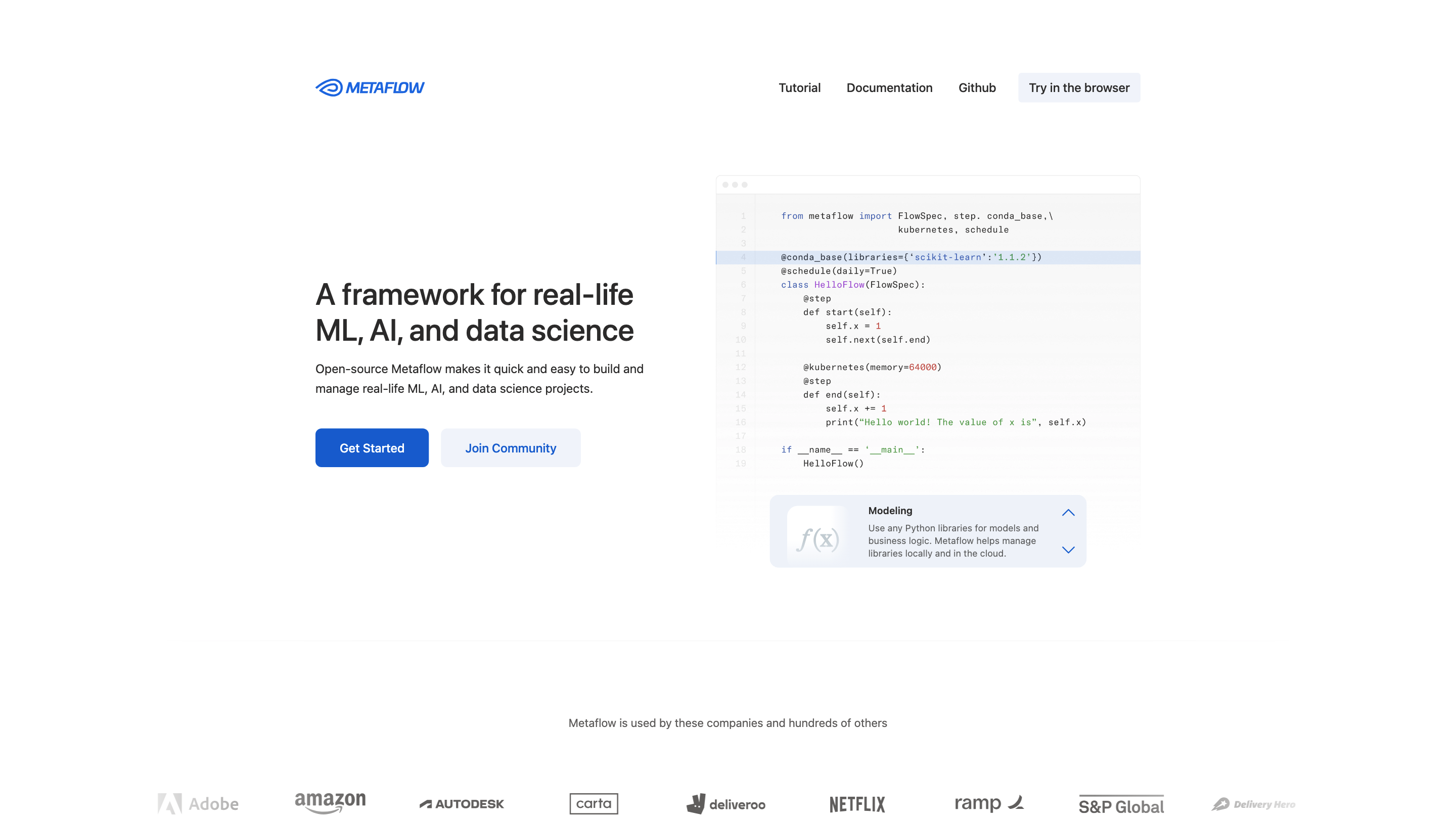Metaflow
Open siteCoding & Development
Introduction
Framework for real-life ML, AI, and data science
Metaflow Product Information
Metaflow is an open-source framework for real-life ML, AI, and data science projects that helps developers build, manage, and deploy complex workflows with ease. Originating at Netflix and now used by hundreds of companies, Metaflow emphasizes developer productivity, experiment tracking, scalable compute, and smooth deployment to production environments. It supports local development, notebook-friendly workflows, and scalable cloud execution (GPUs, multi-core, large memory) with easy integration into existing infrastructure and security policies. The framework focuses on making end-to-end data science pipelines reliable, observable, and collaborative across teams.
Key Capabilities
- Develop with Python: Use any Python libraries for models and business logic; Metaflow handles dependencies and environment management.
- Local-first and notebook-friendly: Develop and test flows locally in notebooks and scripts before scaling to production.
- Robust orchestration: Create multi-step workflows in plain Python with automatic versioning of variables for easy experiment tracking and debugging.
- Compute at scale: Leverage cloud resources, including GPUs and multi-core architectures, to run complex tasks in parallel.
- Data access and lineage: Flows stream data across steps with automatic versioning, enabling reproducibility and auditability.
- Production deployment: Deploy experiments to production with a single command and react to data or event changes automatically.
- Cloud-agnostic deployment: Bring your own cloud—deploy on AWS, Azure, Google Cloud, or Kubernetes—integrating with existing security and governance policies.
- Convert to production safely: Designed for real-life ML/AI workflows, from rapid experimentation to scalable, reliable production runs.
- Rich ecosystem and roadmap: Ongoing updates include support for new compute patterns, real-time cards, PyPI/Conda dependencies, secrets management, and more.
How Metaflow Works
- Model and logic in Python: Define your workflow as a Python class or functions, using Metaflow primitives to manage steps, retries, and artifacts.
- Flow execution: Run flows locally for development or deploy to the cloud for large-scale experiments. Metaflow handles data passing and versioning between steps.
- Deployment to production: Trigger production-ready flows with minimal code changes, integrating with orchestration services as needed.
- Observability & provenance: Track variables, inputs, outputs, and configurations across runs to enable reproducibility and debugging.
Deployment Environments
- Local laptop or workstation for development and testing.
- Cloud environments (AWS, Azure, Google Cloud) with managed services such as Kubernetes clusters, object storage, and compute resources.
- On-premise Kubernetes clusters for secure, policy-governed deployments.
- Metaflow Sandbox for quick, browser-based exploration and learning.
Why Teams Use Metaflow
- Accelerates ML experimentation by simplifying workflow orchestration and dependencies.
- Improves collaboration through versioned flows and centralized experiment tracking.
- Enables scalable, production-grade ML pipelines without rewriting code for each environment.
- Integrates with existing data infrastructure and security controls.
Getting Started
- Install and run flows locally, then gradually scale to cloud deployments as needed.
- Use notebooks to prototype flows and iterate rapidly before committing to production-grade pipelines.
- Explore sample flows and tutorials to learn best practices for data science workflows.
Core Features
- Python-centric workflow definitions with simple orchestration
- Local development with seamless cloud scale-out
- Automatic versioning of flow variables for easy experiment tracking and debugging
- Scalable compute: GPUs, multi-core, and large memory support
- Data access and data lineage across flow steps
- One-click or minimal-change deployment to production
- Cloud-agnostic deployments (AWS, Azure, Google Cloud, Kubernetes)
- Integration with existing security, governance, and data policies
- Real-life ML/AI workflow support and Netflix-originated design
Platform Highlights
- Open-source and community-driven
- Proven in production at Netflix with a broad user base across industries
- Rich release history with features like checkpointing, live dashboards, and reactive flows
Safety and Compliance
- Designed to fit into enterprise policies and governance frameworks
- Emphasizes reproducibility, auditability, and controlled deployment practices
Related Resources
- Documentation, tutorials, and community forums
- Sandbox environment to experiment in the browser
- GitHub repository with ongoing development and contributions
